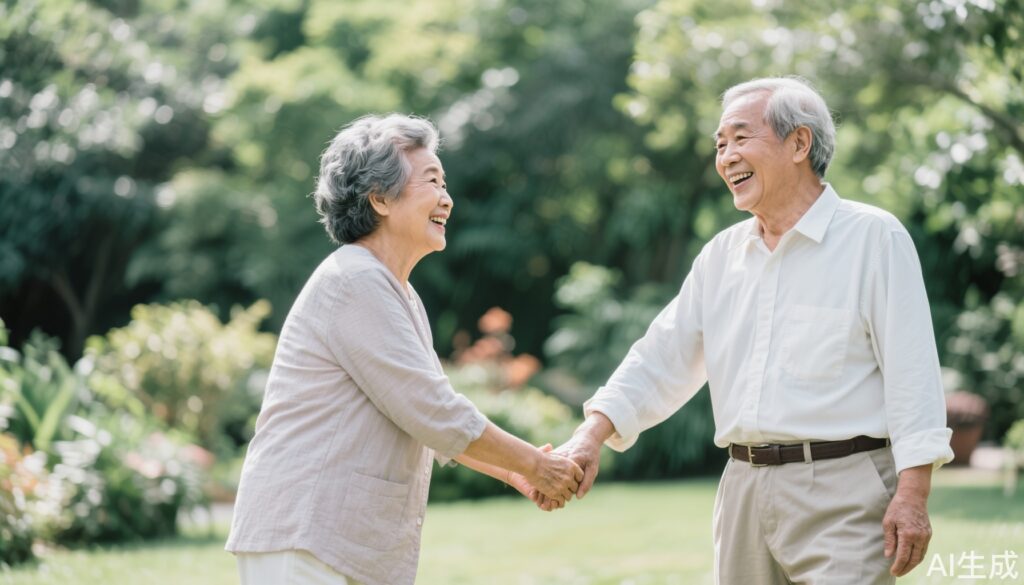Introduction
In many cultures, a common misconception persists that sexual activity in older age damages health, often articulated as warnings like, “Older adults should be cautious—sexual activity might be too much for their bodies.” However, medical studies and clinical experience reveal a far more nuanced truth: maintaining sexual intimacy in later life, when practiced appropriately and moderately, can be beneficial to both the physical and mental health of seniors. This article explores the evidence and expert perspectives on senior sexuality, dispelling myths and offering practical advice suitable for older adults and healthcare providers alike.
Scientific and Clinical Evidence
A landmark 5-year cross-sectional study published in the “Chinese Journal of Geriatrics” demonstrated that individuals aged 70 and above who maintained sexual activity had significantly higher psychological health scores compared to their abstinent peers. This empirical data counters the stereotype that sexuality should cease after a certain age and highlights the role of sexual health as a marker of overall well-being.
Sexual activity acts as a natural physiological stimulus that promotes heart and lung circulation, regulates hormonal balance, and triggers the release of dopamine and endorphins. These neurochemicals reduce anxiety, improve sleep quality, and strengthen the immune system. In an age bracket prone to chronic diseases and psychological stressors, emotional stability and social connection become just as essential as pharmacological interventions.
For example, a long-term cohort study at Beijing Union Medical College Hospital followed 1,200 seniors aged 60 and above and found that those engaging in sexual activities once or twice a month had a lower incidence of cardiovascular events compared to non-sexually active counterparts. This finding suggests regular sexual activity can act as a form of ‘self-therapy’ promoting cardiovascular health under appropriate conditions.
Common Misconceptions About Sexuality in Older Adults
Popular misconceptions often foster unwarranted fears among elderly individuals and their families, leading to unnecessary sexual abstinence. These include:
– Sexual activity is dangerous or harmful for older adults.
– Declining sexual activity means loss of value or health.
– Sexual health is irrelevant in later life.
– Erectile dysfunction or other sexual issues are untreatable problems confined to aging.
Such beliefs can foster harmful behaviors like suppression of sexual desires, social isolation, or mental distress, which are detrimental rather than protective.
Practical Recommendations for Healthy Senior Sexuality
Appropriate sexual activity for seniors is defined by comfort, safety, and emotional satisfaction rather than frequency alone. Key practices include:
– Regular health assessments to determine cardiovascular and general physical fitness.
– Adjusting sexual frequency and positions to accommodate changing energy and health status.
– Maintaining open communication with partners and healthcare providers about sexual needs and concerns.
– Exploring intimacy beyond penetrative sex, such as cuddling, hand-holding, and gentle massage to maintain emotional closeness.
Lifestyle measures also support sexual function, like regular exercise, balanced diet, cessation of smoking and alcohol moderation, and managing chronic conditions such as hypertension or diabetes.
Expert Insights
Dr. Li Wei, a geriatrician, advises, “Sexual activity is a biological and emotional ability that should be maintained as long as the individual’s health allows it. It’s not about how often but the quality and mutual satisfaction that promotes wellness.”
This attitude underlines the shift from viewing elderly sexuality as taboo or dangerous towards embracing it as an integral component of healthy aging.
Patient Scenario: Mr. Robert’s Story
Robert, a 68-year-old retired engineer, experienced chest discomfort and sweating after several sexual encounters, which alarmed him. Upon medical evaluation, his cardiologist identified no acute heart conditions. Instead, Robert’s reduced physical fitness was the limiting factor. After guided aerobic conditioning and lifestyle adjustments, Robert resumed his intimate life with renewed confidence and without complications.
This case illustrates the importance of tailored evaluation and holistic management rather than blanket abstinence.
Beyond Sexual Activity: Intimacy and Emotional Well-being
For seniors unable to maintain traditional sexual activity due to illness or partner availability, alternative expressions of intimacy provide essential psychological benefits. Touch stimulates oxytocin release, a hormone associated with bonding and stress reduction.
Encouraging affectionate behaviors like embracing, holding hands, and gentle massages are practical ways to sustain connection and emotional health.
Conclusion
The narrative that aging necessarily diminishes sexual activity and that such activity is harmful is outdated and unsupported by evidence. On the contrary, moderate and safe sexual intimacy offers significant psychological and physical health advantages.
Healthcare providers should support seniors in maintaining sexual health through informed counseling, personalized risk assessment, and holistic care planning.
Understanding and respecting the sexuality of the elderly is pivotal to promoting dignity, emotional vitality, and improved quality of life in later years.
Let us move beyond ageist taboos and recognize that sexual health is a lifelong facet of human well-being.
References
1. Zhang Y, Wang J, et al. Sexual activity and psychological health in older adults: A cross-sectional study from the Chinese Journal of Geriatrics, 2018.
2. Liu H, Sun J, et al. Association of sexual activity and cardiovascular health in elderly: A cohort study of 1200 subjects. Beijing Union Medical College Hospital, 2020.
3. American Geriatrics Society. Sexual health and aging. J Am Geriatr Soc. 2015.


